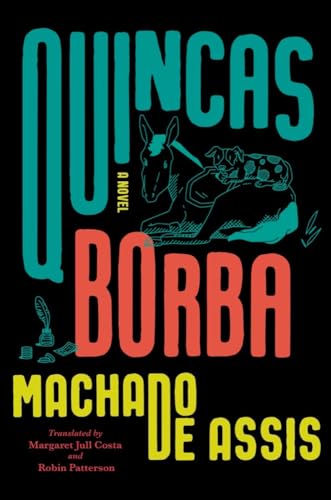Book review of Quincas Borba by Machado de Assis (trans Margaret Jull Costa, Robin Patterson)
Name of Book: QUINCAS Borbas Author: Machado De Assis (trans Margaret Jull Costa and Robin Peterson)
ISBN: 978-1-324-09068-7
Publisher: Live right
Type of book: Brazil, satire, wealth, social class, 1860s-1870s, finances, mental health, Rio De Janeiro, dog, philosophy, parable
Year it was published: 1891 (2024)
Summary:
A vibrant new translation of Machado de Assis’s classic novel about a young man flush with newfound wealth, who promptly gets swindled. Hailed in his lifetime as Brazil’s greatest writer, Machado de Assis (1839–1908) has found a new generation of readers through a series of critically acclaimed translations by Margaret Jull Costa and Robin Patterson. Now, the duo returns to breathe new life into the irreverent, ambitious, and darkly funny Quincas Borba . Originally published in 1891, the novel begins with the death of its titular character, a mad philosopher infamous for spouting pessimistic theories of Humanitism. Borba leaves his fortune―including his dog, also named Quincas Borba―to Rubiao, his loyal caretaker. Adrift in the big, bad, bustling world of late-1860s Rio de Janeiro, it isn’t long before Rubiao is targeted by the city’s sycophants, who can smell his naiveté from a mile away. Playfully told by an omniscient―and possibly unreliable―narrator, and rife with Machado’s signature satirical jabs, Quincas Borba is another strikingly modern tale from a blazing progenitor of twentieth-century fiction.
Characters:
Main character is Rubiao, a caretaker of a wealthy philosopher who has died. Rubiao has inherited a large fortune on condition that he keeps the dog. He is described as cruel, vain and generous, and someone without common sense. The other characters include a couple, one acting as a romantic interest and the other as a manager of the fortune. There are plenty of others such as other possible love interests and friends ( unfortunately I don't recall their names)
Theme:
Money can mean little
Plot:
The story is in third person narrative from everyone's point of view, and it was a very confusing experience for me. From what I understand is that Rubiao is QUINCAS Borbas' caretaker, and upon his death Rubiao inherits a large fortune which he can use on the condition that he takes care of the dog by name QUINCAS Borbas ( yes named after philosopher) he moves to the major city, meets a couple and has quite a lot of adventures revolving finances, love and friendships, ultimately leaving him penniless and insane. I will be honest in saying that for me the most heartbreaking part of the novel is the treatment of the dog, which really caused me to dislike Rubiao.
Author Information:
(From goodreads)
Joaquim Maria Machado de Assis, often known as Machado de Assis, Machado, or Bruxo do Cosme Velho, (June 21, 1839, Rio de Janeiro—September 29, 1908, Rio de Janeiro) was a Brazilian novelist, poet, playwright and short story writer. He is widely regarded as the most important writer of Brazilian literature. However, he did not gain widespread popularity outside Brazil in his own lifetime.
Machado's works had a great influence on Brazilian literary schools of the late 19th century and 20th century. José Saramago, Carlos Fuentes, Susan Sontag and Harold Bloom are among his admirers and Bloom calls him "the supreme black literary artist to date."
The authors writing style and biting sense of sarcasm often reminds me of another I have read, but I can never remember whom it could be. A lot of times for me the author is reminiscent of either Jane Austens style ( minus the obligatory happy ending) but yes he is quite interesting. Oh yes, the book is quite similar to Mark Twains Tom Sawyer! That's whom I was reminded of. I definitely felt a bit overwhelmed reading this book, and definitely feel as if I need to reread it to understand it. A lot of times I had trouble understanding what was going on, unfortunately, although I think the entire novel was kind of a parable of having wealth and how others treat you, so yes, the haves and the have note, and the contrast was very stark.
This was given for review
4 out of 5
(0: Stay away unless a masochist 1: Good for insomnia 2: Horrible but readable; 3: Readable and quickly forgettable, 4: Good, enjoyable 5: Buy it, keep it and never let it go.)

Comments
Post a Comment